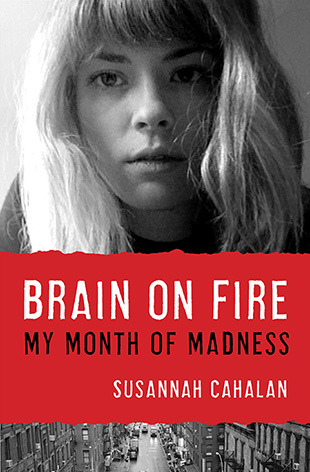I remember the summer after my high school graduation as one gigantic downward spiral of anxiety. It started with weird job hours, then add in play rehearsals, then add in a break-up, then add in your boyfriend hooking up with someone else in your play, and then the light at the end of the tunnel? Move away from every person you’ve ever known or loved and live with strangers and yay, college!
So I harbored all of the usual college-related angst – would I have enough money, would my roommates like me, how would I get to the bank/pharmacy/Target without a car – but some of my worries were more irrational. Example: I became fixated on what would happen if I fell down a flight of stairs and broke my leg. Who would help me? How would I get to the hospital? How would I get home from the hospital? I would probably just die in the stairwell, right?
I hope you don’t think this is a spoiler – Susannah Cahalan does not die in a stairwell at the end of her memoir, Brain on Fire. However, the rest of her story follows my fear down a path so awful that even my wildest anxieties couldn’t have imagined this was a human possibility.
Susannah is a young professional started a journalism career in New York City when she starts feeling tired, getting distracted, and suffering mood swings. Now, please imagine yourself bringing those symptoms to a medical professional – if you even decided to go in the first place, you would be sent home with a prescription of “You are a young professional in New York so calm yourself down and call me once you’ve magically eliminated all of your stressors. Deep breathing. Yoga. Get some sleep, sweetie.” Par for the medical course. But Susannah’s behavior becomes stranger and stranger – blowing work assignments, crying at the drop of a hat and forgetting why in the next moment; and then one night she has a terrifying seizure and her boyfriend takes her to the hospital. For a month, Susannah is shuttled from hospital wing to hospital wing as doctors alternately struggle to figure out what has happened to her, or try to force her into any number of condemning diagnoses – alcoholism, severe manic-depression, sudden onset schizophrena, and more. And what’s more – once the ordeal is over, Susannah can’t remember anything.
This is a medical thriller, like reading an episode of House MD from the patient’s perspective, but it’s also an interesting piece of self-directed journalism. Susannah’s doctors and family try to make sense of her seemingly unexplained symptoms, eventually finding a rare diagnosis (an autoimmune brain disorder that causes sudden psychosis, is largely undiagnosed and misunderstood, and might look to the outside observer like, oh, demon possession). But the work itself is a way that Susannah makes sense of what happened to her, what her life was like before, and what it is like afterwards. The story is devoid of melodrama, there are breaks for medical research (including diagrams), and without a saccharine “and we all lived happy ever after” – Susannah’s journalism training definitely shows. But there’s also the sensitivity of memoir, a certain sense of contemplation in the prose that reminds you that this is autobiographical, a girl’s life, and now she has to deal with the repercussions of what happened. It was a trauma. It might have changed her brain processing forever. Things have changed.
All in all, a quickly moving, sensitive medical memoir that is also completely horrifying. At least if you fall down the stairs and break your leg in public, passersby won’t lock you up in the mental ward. Just sayin’, 18-year-old Jessica. Just sayin’.
